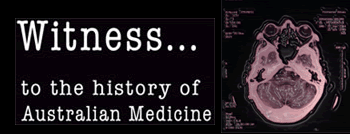


A chapter in the evolution of paediatrics in Australia
Introduction
Participants
Origins of the Department
Early developments
Leadership
New directions in patient care, research and teaching
Ethical issues in research and treatment
Formalising the research effort
Training Programs
Surgical research and training
Finding funds for research
Establishing sub-specialty departments
More on medical education
Academic outreach
Endnotes
Index
Search
Help
Contact us

John McNamara[32] : The question of Vernon Collins as inaugural Professor of Child Health, or Howard Williams. I was a fifth year medical student at the time, but I gathered that when the appointment was made in 1959 there was some difference of opinion among the staff over who was most suitable. I just wonder about the feelings of people at that time.
Ann Westmore: Perhaps we can see it in terms of this difficult sort of marriage that was being attempted in the creation of the Department, a marriage between the Hospital and the University. People had been based wholly in the Hospital or wholly in the University and suddenly there was an attempt to create linkages between them.
Perhaps there were characteristics of Vernon Collins or Howard Williams that were better suited to creating those linkages. I think Arthur [Clark] has said that Vernon Collins was very much "of the Hospital". I don't know about Howard Williams. Was he more amenable to linkage with the University and would that have made a difference to the way the University Department of Paediatrics developed?
David McCredie: Perhaps a comment, having had my feet in both camps. I was a Research Fellow with Howard and, in 1960-61, I went on a Fellowship to America and I came back [in 1962] to find Vernon Collins established as the leader. They were both extremely good candidates and either one would have been suitable.
From my point of view, I worked between the two of them. Vernon Collins was very important getting the new specialty of paediatrics started. And at that stage we had research on respiratory disease under Howard, on cardiology under Mick Powell[33] and gastroenterology was just starting, Charlotte Anderson[34] having come back in the late 1950s, and nephrology was in the distant future a little bit. So Vernon and Howard were always very supportive of me.
That was probably the time when a more academic kind of research developed. Shortly after that, John Court arrived and started studying lipid metabolism with Marjorie Dunlop.[35] But also the name of the department was changed from the Department of Child Health to the Department of Paediatrics in about 1966, appropriately I'd say.[36]
Glenn Bowes: There is a theme here that we've sort of skirted around, and I think itís important to keep the discourse going about this theme. Because today with the Murdoch Childrenís Research Institute thereís just as much need for the University Department of Paediatrics to perform a balancing act between a lab-based, high tech, hard science role and a clinical and public health role. It seems to me that there was a period right at the beginning of the Department where the roots of the same sort of tension were evident. So I donít think itís a matter of speaking ill of those who have been tremendous leaders in the past, but rather examining the roots of that tension. Itís good to keep that conversation going.
Kester Brown[37] : I came a little later on the scene. I well remember my former chief, Margaret McClelland,[38] telling me that probably Vernon Collins' greatest contribution was to get salaried doctors. That made it possible for doctors to specialise in paediatrics and paediatric surgery. Itís for that reason that the Childrenís Hospital in Melbourne grew and expanded the wonderful staff it had, superseding Sydney. That was an absolutely key aspect of the development.[39]
I suspect that comparing these two people, Howard was much stronger in the research area and a great clinician. Vernon Collins probably had the disposition to get the political face of paediatrics up.
 |
Witness to the History of Australian Medicine |  |
© The University of Melbourne 2005-16
Published by eScholarship Research Centre, using the Web Academic Resource Publisher
http://witness.esrc.unimelb.edu.au/008.html